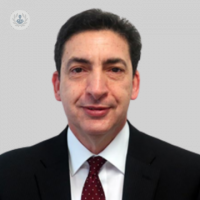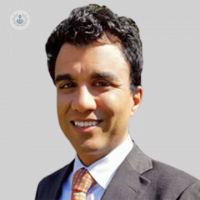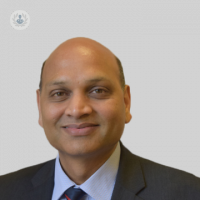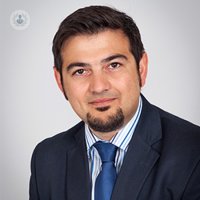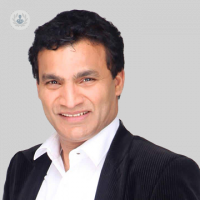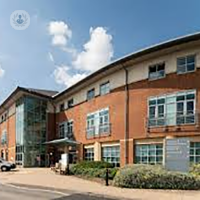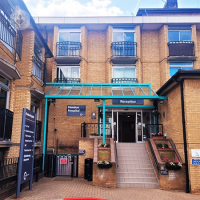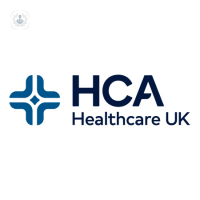What is a slipped disc?
The spine or backbone is made up of segments of bone (vertebrae) separated with fibrocartilaginous discs, which provide flexibility and act as shock-absorbers.
A slipped disc is when one of these soft cushions of tissue pushes outwards. They are often painful, due to the fact that the spinal cord (part of the central nervous system) passes through the middle of them. This means that when a disc herniates (slips), it often puts pressure on nerves.
Slipped discs can occur in the cervical (neck) region, the thoracic (middle back) region, and the lumbar (lower back) region of the spine.
Prognosis of a slipped disc
In the majority of cases, a slipped disc will heal itself with rest, gentle exercise, and painkillers. It is advisable to see a doctor if you are in any pain or experiencing the symptoms listed below and follow their advice. In some cases, further treatment will be required.
Symptoms of a slipped disc
Symptoms of a herniated disc can vary – some people may experience severe problems due to the compression of nerves, while others may never even realise they have slipped a disc. Potential symptoms include:
- Low back pain
- Neck pain
- Difficulty straightening or bending the back
- Numbness or tingling in the back, shoulders, arms, hands, legs or feet
- Muscle weakness
- Sciatica (pressure on the sciatic nerve) – this may involve pain in the legs, hips, or buttocks.
What are the causes of a slipped disc?
Slipped discs can occur for a number of reasons, including:
- Ageing
- Straining during exercise
- Bad technique when lifting heavy objects
- Vibration caused by driving or operating machinery
- Inactivity and/or being overweight
Can a slipped disc be prevented?
The best preventative steps to take are:
- Stay fit and do regular exercise
- When lifting heavy objects, use a safe technique, i.e. not bending or twisting the back.
Treatments for a slipped disc
Depending on the severity of the slipped disc, the doctor may recommend:
- A stronger painkiller
- A muscle relaxant
- A steroid injection
- Physiotherapy
- Surgery (this is usually only considered if other measures have been ineffective and symptoms like numbness are getting worse)
Which type of specialist treats a slipped disc?
Orthopaedic surgeons, particularly those with a specialist interest in spinal surgery treat conditions of the spine, such as a slipped disc.
02-07-2019Поскользнулся диск
What is a slipped disc?
The spine or backbone is made up of segments of bone (vertebrae) separated with fibrocartilaginous discs, which provide flexibility and act as shock-absorbers.
A slipped disc is when one of these soft cushions of tissue pushes outwards. They are often painful, due to the fact that the spinal cord (part of the central nervous system) passes through the middle of them. This means that when a disc herniates (slips), it often puts pressure on nerves.
Slipped discs can occur in the cervical (neck) region, the thoracic (middle back) region, and the lumbar (lower back) region of the spine.
Prognosis of a slipped disc
In the majority of cases, a slipped disc will heal itself with rest, gentle exercise, and painkillers. It is advisable to see a doctor if you are in any pain or experiencing the symptoms listed below and follow their advice. In some cases, further treatment will be required.
Symptoms of a slipped disc
Symptoms of a herniated disc can vary – some people may experience severe problems due to the compression of nerves, while others may never even realise they have slipped a disc. Potential symptoms include:
- Low back pain
- Neck pain
- Difficulty straightening or bending the back
- Numbness or tingling in the back, shoulders, arms, hands, legs or feet
- Muscle weakness
- Sciatica (pressure on the sciatic nerve) – this may involve pain in the legs, hips, or buttocks.
What are the causes of a slipped disc?
Slipped discs can occur for a number of reasons, including:
- Ageing
- Straining during exercise
- Bad technique when lifting heavy objects
- Vibration caused by driving or operating machinery
- Inactivity and/or being overweight
Can a slipped disc be prevented?
The best preventative steps to take are:
- Stay fit and do regular exercise
- When lifting heavy objects, use a safe technique, i.e. not bending or twisting the back.
Treatments for a slipped disc
Depending on the severity of the slipped disc, the doctor may recommend:
- A stronger painkiller
- A muscle relaxant
- A steroid injection
- Physiotherapy
- Surgery (this is usually only considered if other measures have been ineffective and symptoms like numbness are getting worse)
Which type of specialist treats a slipped disc?
Orthopaedic surgeons, particularly those with a specialist interest in spinal surgery treat conditions of the spine, such as a slipped disc.
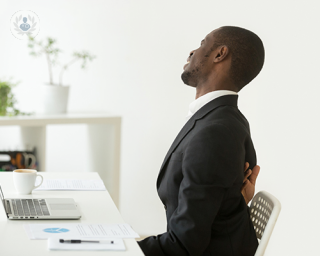

Recovering from a slipped disc
Por Mr G Michael Hess
2024-11-20
Spinal injuries can be very serious. One more common injury is a slipped disc - when the spinal discs that sit between the vertebrae herniate, or slip out of place. We asked leading orthopaedic surgeon Mr G. Michael Hess the important questions. подробнее
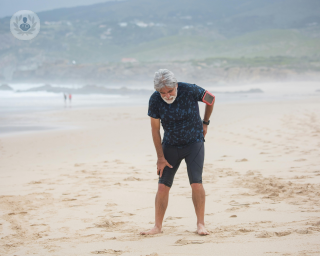

Disc and back pain: A neurosurgeon's perspective
Por Mr Samih Hassan
2024-11-19
Disc and back pain are common conditions that can significantly impact daily activities and overall quality of life. Understanding the relationship between these conditions and neurosurgery is crucial for patients seeking effective treatment options. Leading consultant neurosurgeon Mr Samih Hassan provides comprehensive information about disc and back pain from a neurosurgical perspective in this article. подробнее


Slipped disc: how painful is it?
Por Mrs Anne Mitchener
2024-11-19
A slipped disc may cause symptoms such as pins and needles, numbness and weakness in the back or the legs. We've asked one of our top neurosurgeons Mrs Anne Mitchener to explain whether everyone feels pain or not when it happens and how it happens in the first place. подробнее


How to treat slipped disc in the neck (cervical spine)
Por Mr Ahmed Ibrahim
2024-11-19
We spoke with a highly experienced neurologist, Mr Ahmed Ibrahim, to discuss slipped discs, the causes, symptoms and the different types of cervical spine surgery, whether that's disc replacement, discectomy and fusion surgery, posterior cervical foraminotomy, posterior cervical foraminotomy, posterior cervical fusion and posterior cervical fusion. In this article, we also discuss the postoperative period and recovery. подробнее
Врачи-специалисты в области Поскользнулся диск

The Meriden Hospital - part of Circle Health Group
The Meriden Hospital - part of Circle Health Group
Clifford Bridge Road, Coventry
No existe teléfono en el centro.
Si haces uso de este teléfono facilitado por TOP DOCTORS nos autorizas al tratamiento de tu teléfono para fines estadísticos y comerciales. Para más información, lee nuestra Политика конфиденциальности
Top Doctors

Hendon Hospital - part of Circle Health Group
Hendon Hospital - part of Circle Health Group
46/50 Sunny Gardens Rd, London NW4 1RP
No existe teléfono en el centro.
Si haces uso de este teléfono facilitado por TOP DOCTORS nos autorizas al tratamiento de tu teléfono para fines estadísticos y comerciales. Para más información, lee nuestra Политика конфиденциальности
Top Doctors

The Princess Grace Hospital - part of HCA Healthcare
The Princess Grace Hospital - part of HCA Healthcare
The Princess Grace Hospital, 42-52 Nottingham Pl, W1U 5NY
No existe teléfono en el centro.
Si haces uso de este teléfono facilitado por TOP DOCTORS nos autorizas al tratamiento de tu teléfono para fines estadísticos y comerciales. Para más información, lee nuestra Политика конфиденциальности
Top Doctors
-
The Meriden Hospital - part of Circle Health Group
Clifford Bridge Road, Coventry , CoventryЭксперт в области :
- рак
- Кардиология
- Колоректальная хирургия
- Хирургия плеча
- Хирургия кисти
- Общая хирургия
-
Hendon Hospital - part of Circle Health Group
46/50 Sunny Gardens Rd, London NW4 1RP, North LondonЭксперт в области :
- Кардиология
- Общая хирургия
- гастроэнтерология
- Рука и запястье
- Питание и диетология
- Нога и лодыжка
-
The Princess Grace Hospital - part of HCA Healthcare
The Princess Grace Hospital, 42-52 Nottingham Pl, W1U 5NY, Central LondonЭксперт в области :
- рак
- Общая хирургия
- ортопедическая хирургия
- Роботизированная хирургия
- Интенсивная терапия
- Спортивная медицина
- See more
